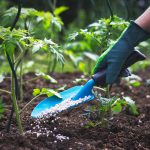Gardeners Beware: Home fertilizers contain alarming levels of forever chemicals, according to new study
 (NaturalHealth365) Powdery mildew, Japanese beetles, weeds, snails, drought – throughout the growing season, gardeners face no shortage of problems and pests. But gardening woes can be far worse than waking one morning to find that the lettuce has been shredded and the tomatoes razed. Forever chemicals (PFAS) in popular home fertilizers made from sewage sludge are contaminating vegetables and harming those who eat them.
(NaturalHealth365) Powdery mildew, Japanese beetles, weeds, snails, drought – throughout the growing season, gardeners face no shortage of problems and pests. But gardening woes can be far worse than waking one morning to find that the lettuce has been shredded and the tomatoes razed. Forever chemicals (PFAS) in popular home fertilizers made from sewage sludge are contaminating vegetables and harming those who eat them.
According to a report from the Sierra Club and Ecology Center, the sewage sludge that wastewater treatment districts across America package and market as home fertilizer, or “biosolids,” contain alarming levels of toxic PFAS. The organization found chemicals in all nine of the brands it tested, and at levels that exceed a screening standard set for land application in the state of Maine, the state with the strictest safeguards for PFAS contamination of agricultural lands. PFAS have been linked to a range of serious health problems, such as cancer, liver disease, birth defects, and endocrine disruption.
The tests conducted by the Sierra Club and Ecology Center found that gardeners can unwittingly bring PFAS contaminants home with the following fertilizers, many of which are marketed as “eco”, “natural”, “reclaimed” or “organic.”
- Cured Bloom (Washington DC)
- TAGRO Mix (Tacoma, Washington)
- Milorganite 6-4-0 (Milwaukee, Wisconsin)
- Pro Care Natural Fertilizer (Madison, Georgia)
- EcoScraps Slow-Release Fertilizer (Las Vegas, Nevada)
- Menards Premium Natural Fertilizer (Eau Claire, Wisconsin)
- GreenEdge Slow Release Fertilizer (Jacksonville, Florida)
- Earthlife Natural Fertilizer (North Andover, Massachusetts)
- Synagro Granulite Fertilizer Pellets (Sacramento area, California)
Roughly 60% of sewage sludge produced by treatment facilities is spread on farmland and gardens
“Biosolid” sludge is expensive to dispose of because it must be landfilled. By lightly treating the sludge and repackaging it as fertilizer the waste management industry has created the ultimate money-spinner, taking the roughly 300 million pounds of feces that Americans send daily from the nation’s toilets to wastewater treatment plants and turning it into something consumers use to fertilize their gardens.
The residual sludge from treating wastewater has been called “the most pollutant-rich manmade substance on earth.” Yes, the sludge contains nitrogen, phosphorous, and other nutrients that help crops grow, but more importantly, it also recycles industrial and synthetic waste.
In 2018, the EPA Office of the Inspector General identified more than 300 pollutants in a single sludge sample, including 61 that it classifies “as acutely hazardous, hazardous or priority pollutants.”
Discover a Simple and Effective Way to Remove Toxins: This is Jonathan's #1 choice for at-home detoxification. Special offer ends Feb. 16.
The wastewater industry ACTUALLY bills biosolids as “green”
Spreading toxic biosolids on gardens and farmlands has been linked to a number of public health problems. Forever chemicals are just part of a broader picture.
According to a study at the University of North Carolina, 75% of people living near farms that spread biosolids experienced health issues like burning eyes, nausea, vomiting, boils, and rashes, while others have contracted MRSA, a penicillin-resistant “superbug.”
If you want a safe garden, don’t wait for stricter regulation of PFAS or the wastewater industry to address its PFAS waste … it won’t happen. Instead, start composting: all those banana peels, eggshells, coffee grounds, and grass clippings, when finally broken down, are fertilizer gold.
Sources for this article include:



